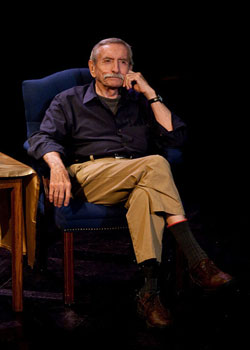News and Events
The UH distinguished professor continues to accumulate awards and teach students
 Edward Albee's plays continue to inspire generations of artists. Works such as "The Zoo Story," "Who's Afraid of Virgina Woolf?" and "A Delicate Balance" are among the American stage classics that motivate young writers.
Edward Albee's plays continue to inspire generations of artists. Works such as "The Zoo Story," "Who's Afraid of Virgina Woolf?" and "A Delicate Balance" are among the American stage classics that motivate young writers.
Thanks to the University of Houston's School of Theatre & Dance, students are learning the craft of playwriting from the man himself.
Each year, Albee selects a few student plays to workshop in his graduate Advanced Playwriting class. UH undergrads also get some face time with the Pulitzer Prize winner through regular question-and-answer sessions conducted in the school's Jose Quintero Theatre.
On March 14, the UH distinguished professor will receive the American Artist Award at the Mead Center in Washington, D.C. The award recognizes artists who have made significant contributions to American theater. Kathleen Turner and Elaine Stritch are among the luminaries who will be on hand to celebrate Albee's work.
Creative Pride sat in on one of the playwright's lively discussions with UH students. The conversation was moderated by Rob Shimko, assistant professor of theater history and dramaturgy.
Question: What is good in American theater these days?
Edward Albee: The fact that it exists. The fact that it's one of the most important art forms. It has a very long history, going back even before the Greeks.
Its great virtue is that it is a live experience between the audience and performed art. It's always in the present tense, and things can go wrong. That's the difference between a play and a movie. When you see a movie, you know that it has already happened. You're seeing a record of something. When go to a play, it's in the present tense. It is happening right in front of you. It's a more intense dramatic experience. That's a very important aspect of theater.
Question: How do you prepare to write or get started on a piece? Do you sit down with an outline?
Albee: Let's go back a little bit. Before I started writing plays, I wrote poetry. I thought that was fun. I wasn't terrible. I even had a few poems published, but I realized that I wasn't good enough to make a career of it, so I gave it up.
I wrote two novels in my teens. One was very, very long. The second one was much shorter. Both of them without question are the two worst novels ever to be written. So, I realized that I couldn't be a novelist. I had problems with short stories too, so I gave up those, too.
That didn't leave much except for plays. So, I started writing plays, and that turned out somewhat better. I've written about 30 plays. I guess 30 and a half, as I'm in the middle of my 31st play.
To oversimplify, I put my plays down on paper to find out why I'm writing them. I'm not one of these playwrights who decides, "Now, I must think of some subject that would be an interesting play. Oh, there's a subject. Okay...now, I must think of characters who will carry the message or my story." I don't work that way.
I discovered that I must have characters, who are people that want to be in the play. And I find out why they want to be in the play. I find out who they are...what their relationships are to each other. That's how I find out what the play is about.
I can never answer the question, "What's your play about?" My best answer to that is "It's about two hours."
Question: The fact that you ended up a playwright suggests you have a knack for figuring out what exactly to put on stage.
Albee: It's all Bach's fault. I've started listening to classical music since I was about 10 or 11, and I discovered Bach.
—Mike Emery
This interview first appeared in UH Media Relations Fine Arts Writer Mike Emery's blog, "Creative Pride," which appears on the Houston Chronicle's chron.com webstie.